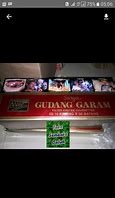
Apa kata Alkitab mengenai judi? Apakah judi itu dosa?
REPUBLIKA.CO.ID,JAKARTA -- Lembaga Riset Keamanan Siber CISSReC menyatakan Indonesia dalam kondisi darurat judi online. Betapa menyeramkannya temuan CISSReC ini, padahal kita ketahui bersama bahwa judi apapun jenisnya sangat diharamkan dalam Islam dan merupakan dosa besar.
Disebutkan oleh Ahmad Sarwat dalam bukunya "Enslikopedia Fikih Indonesia 7: Muamalat" bahwa judi adalah perbuatan haram dan termasuk dosa besar. Keharaman judi ini ditegaskan dalam Alquran, sunnah, dan ijmak ulama.
Dalam surat Al-Baqarah ayat 219 disebutkan, "Mereka bertanya kepadamu tentang khamar dan judi. Katakanlah: "Pada keduanya terdapat dosa yang besar dan beberapa manfaat bagi manusia, tetapi dosa keduanya lebih besar dari manfaatnya."
Kemudian hadits Nabi saw dari Buraidah Al-Aslami ra bahwa Rasulullah saw bersabda: "Orang yang bermain dadu (berjudi) seolah telah memasukkan tangannya ke dalam babi dan darahnya." (HR. Muslim)
Serta seluruh ulama sepanjang zaman telah sepakat bahwa judi adalah perbuatan haram yang telah ditetapkan oleh Allah Swt dan rasul-Nya.
Ulama membedakan judi menjadi dua macam, yaitu maysirul lahwi dan maysirul qimar. Maysirul lahwi adalah judi yang tidak menggunakan uang sebagai pertaruhan, namun tata cara permainannya mirip dan mencirikan umumnya perjudian atau menggunakan alat yang umumnya digunakan dalam perjudian.
Sedangkan maysirul qimar adalah judi yang jelas-jelas menggunakan uang atau harta sebagai taruhannya, meskipun tata cara dan aturan permainannya tidak lazim digunakan oleh orang untuk berjudi.
Di Indonesia sendiri, hal-hal yang disebut sebagai judi ini antara lain seperti mengadu ayam, adu sapi, adu kerbau, pacu kuda, karapan sapi dan adu kambing. Tetapi buka hanya itu, seiring berkembangnya zaman dan teknologi, perjudian bukan hanya menggunakan hewan tetapi juga kartu, mesin, bola, video, dan internet.
Pada umumnya, masyarakat Indonesia berjudi dengan menggunakan kartu remi, domino, rolet. dan dadu. Namun yang paling marak adalah judi togel (toto gelap), yaitu dengan cara menebak dua angka atau lebih. Bila tebakannya tepat, si pembeli mendapatkan hadiah beberapa ratus atau ribu kali lipat dari jumlah uang yang dipertaruhkan.
Uang hasil judi tentu saja menjadi uang haram, sehingga haram pula untuk dimakan, dibelanjakan, atau digunakan untuk memberi nafkah kepada anak istri. Sebab uang haram itu akan tumbuh menjadi darah dan daging yang haram, yang akan mengakibatkan orang yang memakan harta haram itu masuk neraka.
Dalam salah satu haditsnya, Rasulullah saw bersabda tentang daging yang tubuh dari makanan haram: “Siapa saja hamba yang dagingnya tumbuh dari (makanan) haram, neraka lebih pantas baginya.” (HR. At-Tirmidzi)
Riba, berjabat tangan pria wanita, ramalan bintang, wanita memakai parfum saat keluar rumah dan berbagai bentuk maksiat lain kini oleh mayoritas masyarakat muslim sudah dipandang sebagai hal yang biasa. Bahkan bila tidak larut dalam trend maksiat tersebut, seseorang akan mudah dicap kuno dan kolot.
Karena itu, bersama derasnya arus globalisasi banyak nilai-nilai dan tradisi Islam dijungkir balikkan. Dan tak sedikit generasi muda yang terbawa pola hidup permisivisme (serba boleh). Sebelum terlambat sama sekali, umat Islam wajib memahami nilai-nilai ajaran agamanya, lalu merealisasikannya dalam kehidupan sehari-hari.
Di sinilah makna penting kehadiran buku yang ditulis ulama terkenal, Syaikh Muhammad Shalih al-Munajjid ini. Secara gamblang buku ini mengungkap berbagai maksiat yang dipandang biasa di tengah-tengah kehidupan muslim kontemporer. Setiap poin pembahasan, selalu dikuatkan dengan dalil-dalil otentik dari al-Qur`an dan al-Hadits.
Buku ini amat diperlukan bagi siapa saja yang peduli untuk menegakkan tradisi dan budaya Islam di tengah kehidupan masyarakat modern.
I'm going to preface this by stating that al-Munajjid, the author, is currently being held in custody by the Saudi government after his arrest in 2017. He is the founder of the controversial Salafi website IslamQA. He believes homosexuals should be killed, women are required to cover their face and stay within their homes, he is against women driving and being around men. He supports the destruction of statues. He is pro-slave rape. He does not support the free worship of non-Muslims in Muslim countries. "Grave worshiping" also known as Intercession (Shafa'ah) is when a Muslim prays to a deceased individual to intercede on their behalf. Shia followers believe in this, as do Sufi followers, due to the verses in Quran that discuss Muhammad interceding on behalf of followers (Qur’an, 4:64 is one example) as well as plenty of Hadith in which Muhammad says he will intercede on behalf of his followers. To make the blanket statement that this is haram is severely contested. Besides, it is easily argued that people who pray to deceased "friends of God" are praying to PEOPLE not Idols, no one prays to imams or saints as comparisons to god, so there is no provision against this. The only real argument I see against intercession is that if you want something, why not pray directly to the source of what may grant it (the reason for this can be understood from a psychological perspective). "magic, fortune-telling and divination" are described as forms of shirk. This cannot be possible because shirk means believing in other god's than Allah. These practices do not necessitate a need to believe in any God, much less other gods. It is the Salafi opinion that a witch be killed, even if they repent. This opinion posits that magic is real, meaning human beings can intervene God's destiny for mankind. If it is to believed that magic is a falsehood, then the severity of punishment does not fit the crime. Similarly, the one who reads the horoscopes in newspapers and magazines and believes what they say about the influence of the stars and planets is a mushrik, and the one who reads them for entertainment is a sinner, because it is not permitted to entertain oneself by reading things that contain shirk, because Shaytaan will try to lead him to shirk through this." The absurdity of Salafi Islam. You're a sinner for reading something! Regarding the hand of fatimah amulet, the writer says it is shirk to think that anything but Allah can cause harm or benefit... what then is the explanation for belief in the "evil eye" which is accepted as true, or the intervening of Jinn in human destiny? If you do a good deed and tell someone about it with pride, you receive no benefit for the deed.Lots of things apparently are shirk, including saying you swear on anything but Allah. Shirk, btw, is THE unforgivable sin. ((“Time has let me down” (and every other expression which involves cursing time, like saying, “This is a bad time,” “This is an unlucky time,” “Time is a betrayer,” etc., [is shirk] because cursing time is an insult to Allaah Who has created time [...] to use the words “If only…” – which imply discontent and regret, and open the way for Shaytaan, and to say “O Allaah, forgive me if You want to.”)) God seems to be very sensitive to offense. Sitting with hypocrites and wrongdoers to enjoy their company or to keep them company:Many of those who do not have strong faith deliberately sit with people who are immoral and sinful. They may even sit with those who attack the Sharee’ah and make fun of Islam and the people who adhere to it strictly. There is no doubt that this is a forbidden deed, one which could undermine a person’s belief. Allaah says (interpretation of the meaning):“And when you see those who engage in a false conversation about Our Verses by mocking at them, stay away from them till they turn to another topic. And if Shaytaan causes you to forget, then after the remembrance sit not in the company of those people who are the zaalimoon (polytheists and wrongdoers, etc.)” [al-An’aam 6:68]In that case it is not permitted to sit with them, even if they are closely-related or are very kind and good company, except for the purposes of da’wah or refuting their false talk. But accepting and remaining quiet about their conduct is not permitted. Allaah says (interpretation of the meaning):“They (the hypocrites) swear to you (Muslims) that you may be pleased with them, but if you are pleased with them, certainly Allaah is not pleased with the people who are al-faasiqoon (rebellious, disobedient to Allaah).” [al-Tawbah 9:96]<< you cannot be friends with the unbelievers, what a world the Salafi's envisionYou can't go to the Mosque after eating onions or garlic, because it "offends the angels". "The married man who commits adultery deserves the worst kind of punishment, which is stoning to death, so that he may taste the results of his deeds and so that every part of his body may suffer just as every part of his body enjoyed the illicit liaison." ((In Islam, those guilty of this crime are to be killed by the sword, according to the soundest opinion. This punishment is to carried out on both the one who does this and the one to whom it is done, if it is done freely and by choice. Ibn ‘Abbaas reported that the Prophet said: “Whomever you find committing the sin of the people of Lut, kill them – both the one who does it and the one to whom it is done.”. The modern-day spread of incurable diseases like the killer AIDS caused by this corruption, that were unknown to our predecessors, is an indication of the wisdom of the Sharee’ah in prescribing this severe punishment.))((Abu Hurayrah reported that the Prophet said: “If a man calls his wife to his bed, and she refuses, and he goes to sleep angry with her, the angels will curse her until morning.”))((A wife should hasten to respond to her husband’s call if he wants her, in obedience to the words of the Prophet: “If a man calls his wife to his bed, let her respond, even if she is riding on the back of a camel (i.e., very busy).”))You should only divorce your husband if he is committing sins. Otherwise you won't get into heaven. So if you fall out of love or don't enjoy his company, tough luck. You gotta saddle up and spend the rest of your life miserable with a man who you do not love (and then you get to spend rest of eternity with him if you both make it to heaven). While consensual anal sex with your wife is mentioned here, there is no mention of what punishment befalls an individual who does and further google research comes up short. It mentions that it is haram to spend more time or money on one wife than another, but Muhammad himself did this during his marriage to Aisha where she was given twice as much time as any other wife. You cannot shake the hands of your cousins or in-laws, or be alone with them. Perfume is forbidden for women to wear publicly. It makes you an adulterer. If you wear perfume, it makes you so impure that you must preform ghusl (as in, she is in the same state as one who just had sex!) You cant travel without a man ((This prohibition applies also to a woman travelling by plane, even if – as is often claimed – one mahram sees her off at one end and another mahram meets her at the other. Who is going to sit next to her during the journey?)) but of course, men are free to travel without a woman. If the reason for this is to prevent women from being molested, why is it not prohibited for men for the same reason? You cannot look at the nakedness of men or women. "one who accepts immoral conduct on the part of his family" will go to hell. I guess this is why there are the harami-police. "Generally speaking, it is haraam to be directly or indirectly involved with riba in any way, shape or form." - sorry Muslims living in Western lands with a credit card, Muhammad and Allah have cursed you. ((The Prophet said: “Knowingly consuming a dirham of riba is worse for a man than committing adultery thirty-six times.”))Apparently you are not supposed to work or shop on Friday during prayers, so I am advocating for a 3 day weekend ;) Charity raffles are HARAM. Lol. I can hardly take this seriously. Buying a product which includes something unknown - so mystery boxes and unboxing is HARAM. Insurance is HARAM. Omg. All theft should be dealt with by cutting off the hand, including theft of food (as is said in the hadith about one who steals an egg). It's haram to make money by singing.If you drink even a drop of alcohol, you're going to drink the people of hell's sweat. If you died having not repented, you will be to Allah as one who worships idols. Pretty harsh! You cannot eat off of, drink out of, or even display silver or gold dishes. Music is HARAM. However, it fails to mention the times the prophet listened to music or allowed it in various settings. "What is very difficult is the fact that nowadays music is a part of so many things, such as clocks, doorbells, children’s toys, computers, telephones, etc., and avoiding it takes a great deal of determination. Allaah is the source of help."The Prophet said: “Do you know what gheebah (gossip or backbiting) is?” They said, “Allaah and His Messenger know best.” He said: “To say something about your brother that he does not want to be said.” He was asked, “What do you think if what is said about him is true?” He said, “If what you say about him is true, this is backbiting, and if what you say about him is not true, this is a lie.” - so I guess you shouldn't correct a fellow Muslim on their character?It's haram to look into people's houses without asking. You will be punished by having an eye removed. ITS HARAM TO TALK TO ANOTHER WHILE EXCLUDING ANOTHER!You shouldn't wear western clothes because you resemble the kuffaar. Wigs are forbidden. The Prophet said: “Allaah has cursed effeminate men and masculine women.”It's forbidden to dye the hair black. PICTURES (of animate beings) ARE HARAM. Having pictures in your house (or dogs) prevents ange
Can You Chip In?Dear Patron: Please don't scroll past this. The Internet Archive is a nonprofit fighting for universal access to quality information. We build and maintain all our own systems, but we don’t charge for access, sell user information, or run ads. Instead, we're powered by online donations averaging $15.58. We'd be deeply grateful if you'd join the one in a thousand users that support us financially. We understand that not everyone can donate right now, but if you can afford to contribute this Sunday, we promise it will be put to good use. Our resources are crucial for knowledge lovers everywhere—so if you find all these bits and bytes useful, please pitch in.
Can You Chip In? Dear Patron: Please don't scroll past this. The Internet Archive is a nonprofit that relies on online donations averaging $15.58. If you find all these bits and bytes useful, please pitch in.
Bukan Cuma Main Judi, tetapi Hati
Menurut KBBI, judi adalah “permainan dengan memakai uang atau barang berharga sebagai taruhan.” Singkatnya, permainan yang mempertaruhkan barang berharga dapat menjadi ajang perjudian.
Kita sering mendengarnya. Misalnya, judi dengan kartu. Judi bola, yang menggunakan tebak-tebakan skor. Atau judi di kasino dengan berbagai mesin permainan. Semuanya mempertaruhkan uang sebagai sumber ketegangan. Tidak heran, perjudian tampak memukau, karena memberi keuntungan dan rasa tegang.
Meskipun kata “main judi” secara spesifik tidak muncul dalam Alkitab, prinsip-prinsip yang diajarkan sangatlah jelas. Alkitab mengajarkan kita untuk tidak menyia-nyiakan uang dan untuk menghindari keinginan cepat kaya. Misalnya, di 1 Timotius 6:10 kita diberitahu, “Karena akar segala kejahatan ialah cinta uang. Sebab oleh memburu uanglah beberapa orang telah menyimpang dari iman dan menyiksa dirinya dengan berbagai-bagai duka.“
Kita jelas diperingatkan untuk tidak mencintai uang, dan mengelola baik-baik pemberian Tuhan. Berjudi, sebaliknya, adalah lawan dari kedua hal tersebut. Dengan berjudi, kita terpacu untuk memenangi uang sebanyak-banyaknya, tanpa sadar akan risiko besar di baliknya. Akhirnya berkat Tuhan pun tersia-sia demi keuntungan yang tak jelas.
Jadi jelas, perjudian adalah batu sandungan besar dalam hidup rohani.
Mendorong Keserakahan
Alkitab mengajarkan kita untuk berpuas diri dengan apa yang kita miliki. Dalam Ibrani 13:5 dikatakan, “Janganlah kamu menjadi hamba uang dan cukupkanlah dirimu dengan apa yang ada padamu. ” Main judi, dengan harapan memperoleh lebih, bertentangan dengan prinsip ini. Kita akan terus terpacu untuk main lagi dan lagi, untuk menang lagi dan lagi. Bukankah itu yang disebut serakah?
Tampilkan Bahasa Isyarat Saja
Hanya Bisa Download Publikasi
Berita tentang judi sedang naik belakangan ini, utamanya dalam bentuk online. Main judi terasa begitu menjanjikan. Dengan sedikit uang, kita bisa menang besar. Apalagi Alkitab tidak mengatakan apapun tentang hal ini. Lantas, bolehkah kita berjudi?
Menggantikan Kepercayaan kepada Tuhan
Alih-alih bergantung pada Tuhan untuk memenuhi kebutuhan kita, main judi bisa membuat seseorang bergantung pada keberuntungan. Padahal, dalam Yesaya 17:7 dikatakan, “Terkutuklah orang yang mengandalkan manusia, yang mengandalkan kekuatannya sendiri, dan yang hatinya menjauh dari pada Tuhan!”
Berisiko Terlilit Utang
Masalah sering muncul ketika seseorang kehilangan uang dalam main judi, terutama jika ia berutang dengan harapan akan menang. Ketika ia kalah dan tidak mampu membayar uang kembali, si pemain tentu akan terjerumus.
Seperti dikatakan dalam Amsal 22:7, “yang berhutang menjadi budak dari yang menghutangi.” Sudah banyak cerita orang yang terlilit utang piutang karena judi.
Alasan Menghindari Main Judi
Berikut 4 alasan lagi untuk menghindari perjudian.
Seperti yang diajarkan dalam Amsal 21:20, “Harta yang indah dan minyak ada di kediaman orang bijak, tetapi orang yang bebal memboroskannya.” Saat kita berjudi, kita mempertaruhkan uang yang seharusnya digunakan untuk kebutuhan atau untuk mendukung karya Kerajaan Tuhan.
Padahal, jelas Tuhan ingin kita mengelola semua yang kita miliki dengan bijak (Matius 25:14-15).
Judi = Menyalahgunakan Kepercayaan Tuhan
Meskipun Alkitab tidak secara spesifik menyebutkan tentang main judi, prinsip-prinsip yang terkandung di dalamnya memberi kita panduan yang jelas.
Pada akhirnya, berjudi adalah perbuatan yang tidak menghargai kepercayaan Tuhan kepada kita. Juga, dengan berjudi, kita terjebak dalam hawa nafsu dan merugikan diri sendiri. Mari hindari perjudian, apapun bentuknya, sehingga hidup kita tetap memuliakan Tuhan.
(Visited 2,743 times, 5 visits today)
Last modified: Oct 24



